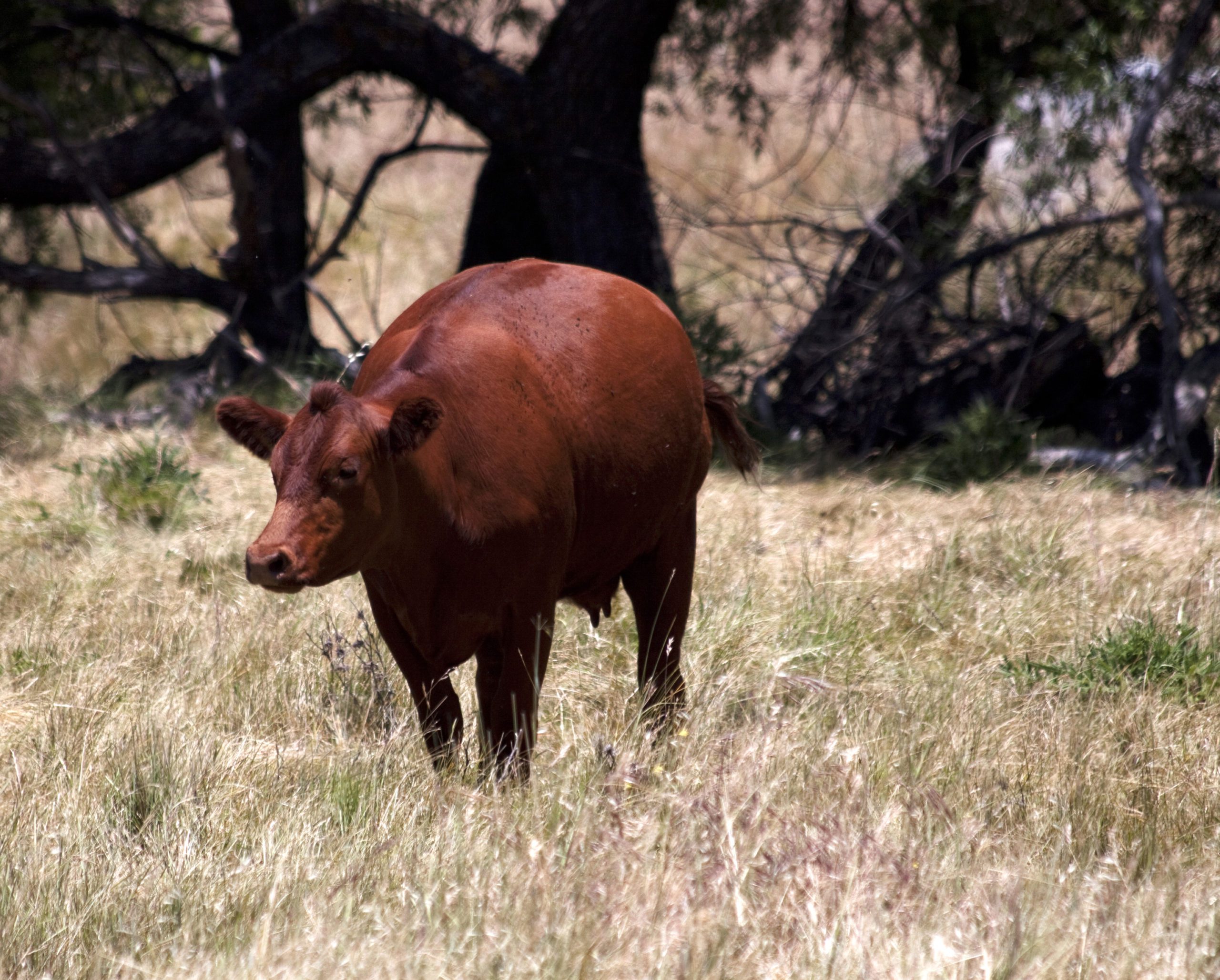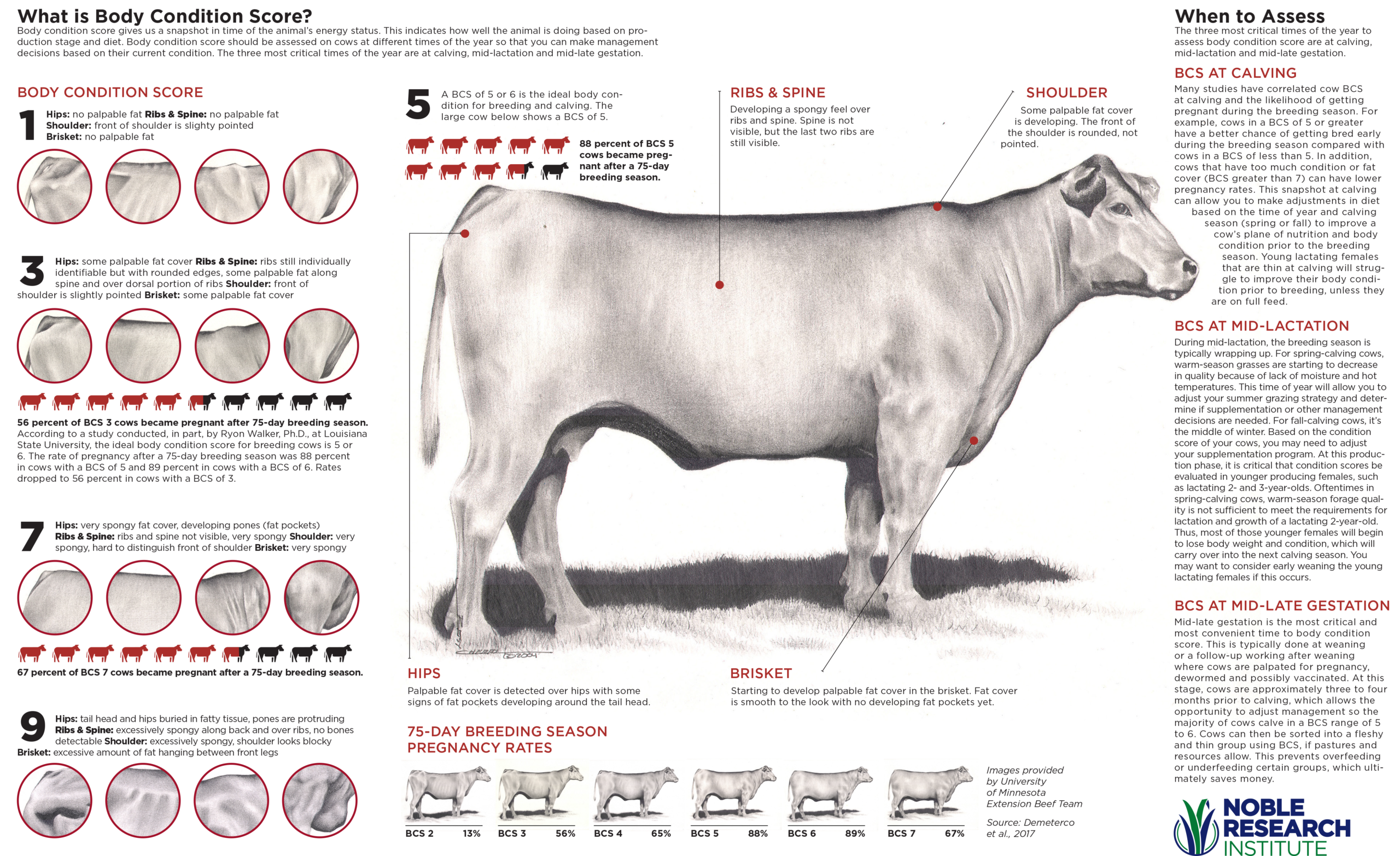
The third trimester of a cow’s pregnancy places great demands on her body that were not experienced during the first two trimesters. The third trimester starts at around 90 – 95 days prior to calving. Between cold late winter weather and the rapidly increasing requirements of the growing calf, the whole nutritional picture must be taken into account to ensure a healthy mother and baby.
The Role of Body Condition Score (BCS) in Cow-Calf Health
The body condition score (BCS) is a simple, inexpensive, and accurate means of determining whether a cow is properly utilizing feed and has enough fat, muscle, and energy stores. In the United States and Canada, the BCS scale runs from 1 through 5 (or 1 through 9), with one being an animal that is in very poor condition and five (or 9) being obese. The BCS of a cow going into the third trimester will help determine how well she and the calf will fair in the coming months. A BCS of 3 – 4 (5 – 6) is optimal for a cow entering the third trimester.
Cows with marginal or even low BCS will require a much higher level of supplementation than those animals that enter their third trimester in ideal body condition. Even then, complications such as a stillbirth or inability to breed back are possible.
The chart below is provided with permission by noble.org. To download or view full-size version, click here.

Vital nutrients for late-pregancy cows
There are a number of nutrients that must be available in adequate amounts to support the proper growth of a fetus while also nourishing the cow. These needs will continue to increase until birth, making it imperative that those requirements are met.
PROTEIN
Protein is a vital building block for every system of a growing calf. To maintain proper muscle and support organs, cows must also be receiving enough protein without the calf’s increasing needs drawing on her reserves.
Protein can be found in forages such as alfalfa or formulated feeds such as lick tubs or cubes. Forage in some areas may provide adequate protein but it is always a good idea to have testing done to make sure that nutrient levels are optimal and to identify any gaps so they can be supplemented.
CARBOHYDRATES
Carbohydrates provide the energy necessary for daily activity; they are also required for the proper function of organs and body systems. In addition, they help maintain essential fat reserves that keep a cow in a positive energy balance.
Most high-quality forages will provide decent levels of energy. If, however, the forage quality has declined over the winter or there simply isn’t enough available, supplementation is likely needed. This can be provided through the addition of tubs, distillers grains, cubes, or other energy sources.
VITAMINS
Certain vitamins are an important part of the development of a healthy fetus. Vitamins A and E, particularly, should be available in sufficient quantities. Vitamin A is needed by both the mother and her calf – if her colostrum is rich in Vitamin A, the calf’s likelihood of developing scours decreases. For the mother, successful post-partum expulsion of the placenta has been linked to an adequate intake of Vitamin A.
Cows require Vitamin E to improve Vitamin A absorption, in addition to minerals such as selenium. White muscle disease in calves is usually due to the mother having a Vitamin E deficiency during her pregnancy, and as such, not absorbing necessary levels of selenium.
Both Vitamins A and E can be found in forages; lush green pastures and hay. Aging hay and forage will likely have lower-than-ideal levels of these vitamins, so supplementation with alfalfa meal or even loose vitamin/mineral supplements might be needed for the pregnant cow to receive the quantities she needs.
MINERALS
Determining which minerals should be supplemented in pregnant cows depends on a wide variety of factors. Trace mineral levels are often dictated by the soil in which feed and forage was grown. By default, however, pregnant cows will require an increase in their calcium and magnesium intake to support fetal bone growth and prepare for lactation.
Regional mineral formulas are an excellent way to provide your pregnant cows with the minerals they need. Both block and loose mineral forms work well and will allow animals to self-regulate and consume as much as they need.
The Homestretch
The nutritional support a cow receives in the final months of her pregnancy will invariably influence the health of both mother and calf. Colostrum quality from a nutrient-deficient cow will not provide the support the calf will need, making it doubly important to pay special attention to third-trimester nutrition.
Adequate high-quality feed, water, and supplementation (as needed), will be the key factors in a successful calving season for both mothers and babies.
